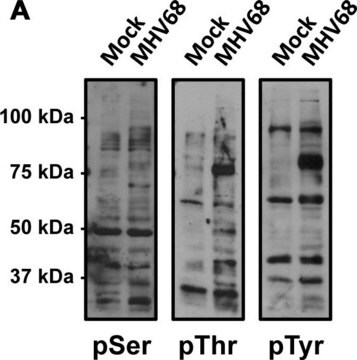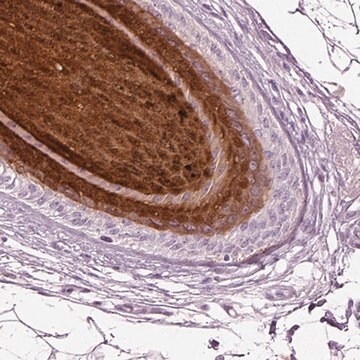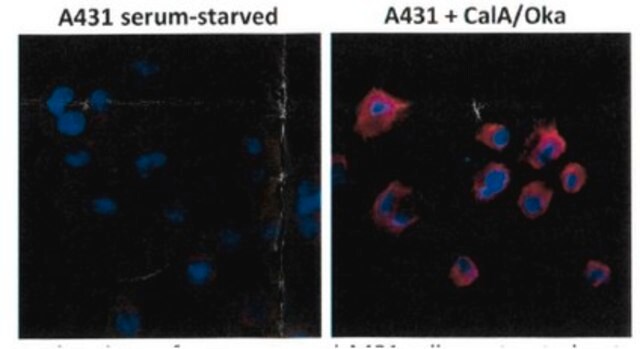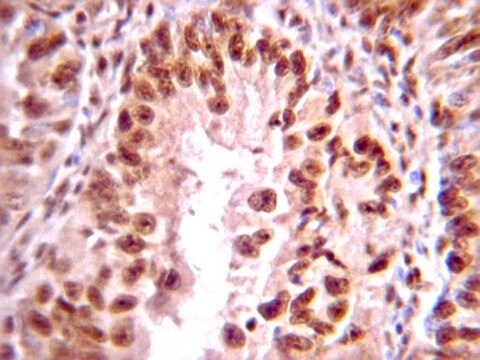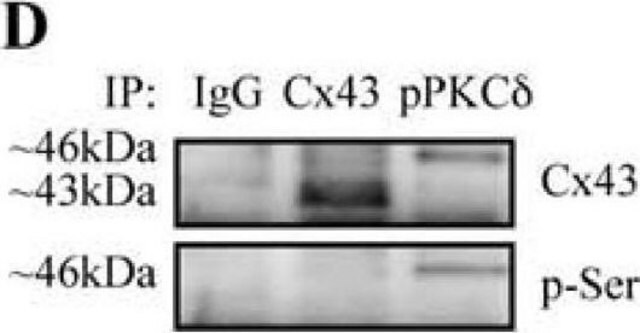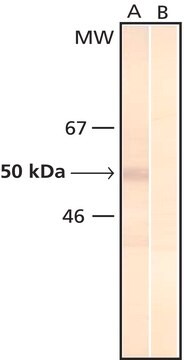07-1473
Anti-Phosphothreonine-Proline Antibody
from rabbit, purified by affinity chromatography
Sign Into View Organizational & Contract Pricing
All Photos(1)
About This Item
UNSPSC Code:
12352203
eCl@ss:
32160702
NACRES:
NA.41
Recommended Products
biological source
rabbit
Quality Level
antibody form
affinity isolated antibody
antibody product type
primary antibodies
clone
polyclonal
purified by
affinity chromatography
species reactivity
mouse, rat, human
technique(s)
western blot: suitable
shipped in
wet ice
target post-translational modification
phosphorylation (pThr)
General description
Phosphothreonine-Proline, along with similar motifs involving serine/threonine residues preceding proline undergoing phosphorylation, has critical roles in the moderation of various cellular processes, protein function, and kinases through proline-directed phosphorylation. The deregulation of proline-directed phosphorylation is known to be a factor in diseases such as cancer and Alzheimer’s neurodegeneration.
Specificity
Recognizes the phosphorylated phothreonine-proline motif, which is the site of phosphorylation of many proline-directed protein kinase such MAPK and cyclin-dependent protein kinases. Also recognizes the phosphoserine-proline motif to a similar degree.
Immunogen
KLH-phosphothreonine-proline amide
(pT-P-NH2) peptide conjugates
(pT-P-NH2) peptide conjugates
Application
Detect Phosphothreonine-Proline using this Anti-Phosphothreonine-Proline Antibody validated for use in WB.
Quality
Evaluated by Western Blot in Calyculin treated Jurkat cell lysate.
Western Blot Analysis: 1:500 dilution of this lot detected phosphorylated proteins on 10 μg of calyculin treated Jurkat lysates.
Western Blot Analysis: 1:500 dilution of this lot detected phosphorylated proteins on 10 μg of calyculin treated Jurkat lysates.
Linkage
Replaces: AB3192
Physical form
Liquid in TBS with 0.05% sodium azide and 50% glycerol.
Storage and Stability
Maintain at -20°C in undiluted aliquots for up to 12 months from date of receipt.
Note: Variability in freezer temperatures below -20°C may cause glycerol containing solutions to become frozen during storage.
Note: Variability in freezer temperatures below -20°C may cause glycerol containing solutions to become frozen during storage.
Analysis Note
Control
Calyculin treated Jurkat cell lysate
Calyculin treated Jurkat cell lysate
Other Notes
Concentration: Please refer to the Certificate of Analysis for the lot-specific concentration.
Not finding the right product?
Try our Product Selector Tool.
Storage Class Code
12 - Non Combustible Liquids
WGK
nwg
Flash Point(F)
Not applicable
Flash Point(C)
Not applicable
Certificates of Analysis (COA)
Search for Certificates of Analysis (COA) by entering the products Lot/Batch Number. Lot and Batch Numbers can be found on a product’s label following the words ‘Lot’ or ‘Batch’.
Already Own This Product?
Find documentation for the products that you have recently purchased in the Document Library.
Our team of scientists has experience in all areas of research including Life Science, Material Science, Chemical Synthesis, Chromatography, Analytical and many others.
Contact Technical Service